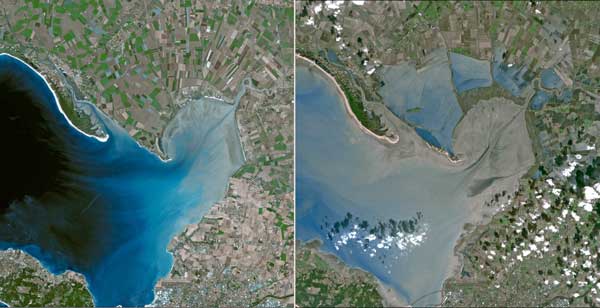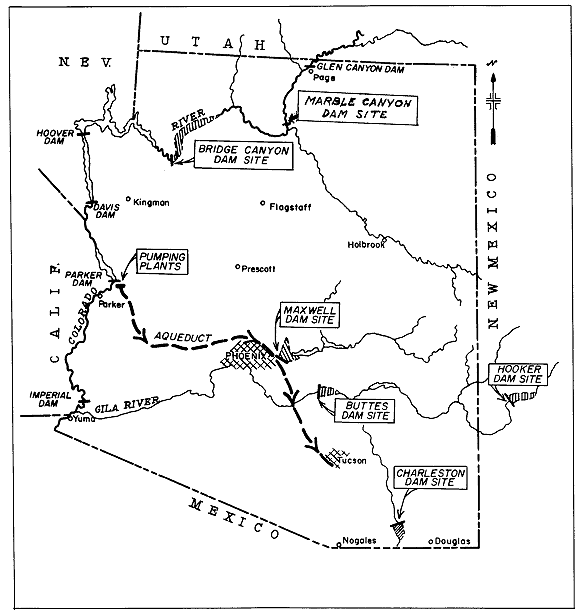The week that was 2/28-3/6/2010
Posted on | March 7, 2010 | 4 Comments

Before and after the flooding in La Faute sur Mer (France). Source: Spot Image. The SPOT 4 satellite acquired an image on March 2nd that reflects the extent of the flooding on the coast and the island of Ré. Click on the photos to be taken to Spot Image.
“We have winds this strong every year, but what wasn’t emphasized by the French government, or weather services, was the fact that the winds would be combined with a high tide.” — French hotelier Mario Hamelin, “Atlantic storm Xynthia kills dozens in Western Europe,” Los Angeles Times, March 1, 2010
“We have to ask how in France, in the 21st century, families can be surprised in their sleep and drown in their homes.” — French President Nicolas Sarkozy, “Europe storm death toll at 62; France hardest hit,” Associated Press, March 1, 2010
“High tides are higher today.” — Chris Bergh, director of the Florida Keys program, the Nature Conservancy, “As Florida Keys residents confront rising sea levels, what lessons?” Christian Science Monitor, March 4, 2010, via Aquafornia
“… the climate system is changing in a number of ways which follow the pattern of climate change predicted by computer models. The only plausible explanation is that changes are happening as a result of human activity, including man-made greenhouse gas emissions. — News release, “Climate change and human influence,” The UK Met Office, March 5, 2010
 … it is likely that there is more liquid water on Europa than on all the oceans, rivers and glaciers of Earth put together. — “The seven wonders of the solar system” by Manchester University physics professor Brian Cox, The Daily Telegraph, March 2, 2010
… it is likely that there is more liquid water on Europa than on all the oceans, rivers and glaciers of Earth put together. — “The seven wonders of the solar system” by Manchester University physics professor Brian Cox, The Daily Telegraph, March 2, 2010
“It just happened that we had water and they needed that water.” — David Smith of “master planned communities” developer DMB Associates on a water sale to Tejon Ranch, “Redwood City Saltworks developer poised to become major Bay Area water baron,” Mercury News, March 1, 2010
“What am I going to tell folks when farmers sell their water and put farmworkers out of a job — and they make millions at the public’s expense?” — California Assembly Member Juan Arambula, I-Fresno, “Bill aims to stop farmers from selling water pacts,” Fresno Bee, March 1, 2010
The only thing they try to escape ownership of is the waste.” — Scott Edwards, director of advocacy for the Waterkeeper Alliance, “Groups file pollution lawsuit against Perdue, chicken farmer,” Baltimore Sun, March 2, 2010
The country simply has more dung than it can handle. — “Manure becomes pollutant as its volume becomes unmanageable,” Washington Post, March 1, 2010, via Aquafornia

Political Ecologies of Cattle Ranching in Northern Mexico by Eric P. Perramond. Click on the cover to be taken to the University of Arizona press.
Ranchers are not an amorphous body of rural evil-doers oppressing communal farmers and ranchers in Mexico. — “Shill alert — On old Mexico and cattle,” Acequias and Adjudication: A blog on water rights in New Mexico, March 3, 2010
No new magic technology needs to be developed. — Pacific Institute president Peter Gleick in “City Brights” on agricultural water savings that he says are within reach, “Farm water success stories,” San Francisco Chronicle, March 3, 2010
Manual and electronic readings today indicate that water content in California’s mountain snowpack is 107 percent of normal for the date, — “Department of Water Resources announces third snow survey results of 200-2010 season,” March 3, 2010
With snowpack levels in much of the Cascade Mountain Range at 25 percent or more below average, Gov. Chris Gregoire has asked the state Legislature to re-establish the state’s drought relief reserves. — Press release, office of the governor, Washington State, March 1, 2010
If current runoff trends continue, the Central Arizona Project could run short of water by 2012 for the first time in its 25-year history. — Tom McCann, CAP assistant general manager for operations, planning and engineering, “Tucson’s source of water runs low: Spring runoff into Lake Powell, which supplies CAP, looks weak,” Arizona Daily Star, March 4, 2010

“I am working hard on issues that I think everyone would agree are far more important than some minor impact on the fisheries.” — David S. Freeman, acting general manager, Los Angeles Department of Water & Power, “Power plants criticize proposal to block use of seawater for cooling machinery,” Los Angeles Times, March 1, 2010
The state’s estimate is that OTC power plants kill between 8%-30% of Southern California nearshore sportfish. That’s a huge impact. — Mark Gold, president of Heal the Bay, “Spouting off,” March 1, 2010
Stay. The Hell. Off the ice. — Opinion piece about a spate of drownings that are only possible because normal safety regulations for land do not extend to frozen water, “Get them off our slushy rivers, lakes,” Ottawa Citizen, March 3, 2010
Georgia leaders are trying to rally other states as allies in pursuing new classification from Congress for all the Army Corps’ lakes. — “Atlanta case raises questions about water supply,” Associated Press, March 5, 2010
“I call this a ‘Good Neighbor bill.’ If I lived in Alabama or Florida, I would say, ‘They’re doing things in Georgia.'” — Rep. Lynn Smith (R-Newnan), Natural Resources chairworman, Georgia House of Representatives, “House panel OKs conservation bill. Goal: To make a positive impression on Alabama, Florida in water war,” Atlanta Journal-Constitution, March 2, 2o1o
“That would have been the best-case scenario.” — John Entsminger, Deputy Counsel, Southern Nevada Water Authority, “Officials not surprised that bid to reshape Nevada’s water law didn’t get passed,” March 1, 2010
“It was satisfying to see it pull away from the base.” — Bob Smith, demolitionist on the Washington Closure Hanford project, “Water tower at D Reactor tumbles down (w/video),” Tri-City Herald Mid-Columbia News, March 3, 2010
 “The game plan is to emphasize the scary possibilities. If you can get Glenn Beck to say that government storm troopers are going to invade your property, farmers in the Midwest will light up their congressmen’s switchboards” — anonymous member of the Water Advocacy Coalition, which has been fighting to restore the original reach of the Clean Water Act, “Rulings restrict Clean Water Act, Hampering EPA,” part of the “Toxic Waters” series, The New York Times, February 28, 2010
“The game plan is to emphasize the scary possibilities. If you can get Glenn Beck to say that government storm troopers are going to invade your property, farmers in the Midwest will light up their congressmen’s switchboards” — anonymous member of the Water Advocacy Coalition, which has been fighting to restore the original reach of the Clean Water Act, “Rulings restrict Clean Water Act, Hampering EPA,” part of the “Toxic Waters” series, The New York Times, February 28, 2010
“The river has moved some 100 feet since we built that pond in 1987. It’s through no fault of our own that we can’t control the river.” — Eden Prairie Public Works Director Gene Dietz, “Eden Prairie is ordered to inspect all its storm ponds,” Minneapolis-St Paul Star Tribune, March 2, 2010
![]() “Over the next five years Worcester faces: $200 million in capital improvements and $5 million in added annual operating costs at the Upper Blackstone treatment plant to comply with the 2008 permit currently under appeal. This cost alone will add over $200 per year to the typical ratepayer’s bill. These costs are in addition to the $180 million already being spent; a potential $1.2 billion to meet the terms of a new storm water permit expected this year, a permit worded in a way that makes the city vulnerable to lawsuits from environmental groups. In addition, the city faces costs of $5 million over the next five years for CSO permit compliance, and $7 million over the next five years to deal with sanitary sewer overflows as directed by an order from EPA. This order included a fine against the city of $125,000. — “As I see it,” an opinion piece by Robert L. Moylan Jr, Commissioner of Public Works and Parks, City of Worcester, Telegram & Gazette, March 5, 2010
“Over the next five years Worcester faces: $200 million in capital improvements and $5 million in added annual operating costs at the Upper Blackstone treatment plant to comply with the 2008 permit currently under appeal. This cost alone will add over $200 per year to the typical ratepayer’s bill. These costs are in addition to the $180 million already being spent; a potential $1.2 billion to meet the terms of a new storm water permit expected this year, a permit worded in a way that makes the city vulnerable to lawsuits from environmental groups. In addition, the city faces costs of $5 million over the next five years for CSO permit compliance, and $7 million over the next five years to deal with sanitary sewer overflows as directed by an order from EPA. This order included a fine against the city of $125,000. — “As I see it,” an opinion piece by Robert L. Moylan Jr, Commissioner of Public Works and Parks, City of Worcester, Telegram & Gazette, March 5, 2010
There are no sources of money that large. — “Restoring Willamette Valley streams would take up to $1.2 billion,” The Oregonian, March 4, 2010
Crystal Geyser officials said they do not want the figure [of how much water they pump] made public because that could provide trade secrets to their competitors, who could make assumptions based on the data. — “More controversy pours out of Crystal Geyser,” Orland Press-Register, March 2, 2010
The city has said the [Crystal Geyser plant] plans are not subject to CEQA review because there is no possibility of significant impact on the environment. — “First lawsuit regarding Orland water bottling plant officially sent to court,” Chico Enterprise-Record, March 3, 2010, via Aquafornia
For a full round-up of California water stories, go to Aquafornia, the news feed of the Water Education Foundation. Also warmly recommended for its news service: UC Berkeley’s “On Water.”
Comments
4 Responses to “The week that was 2/28-3/6/2010”
Leave a Reply




March 8th, 2010 @ 6:26 am
Thanks for the book notice and shill feed Emily. Much obliged, and this week’s summary is brilliant…
March 8th, 2010 @ 9:55 am
That Crystal Geyser position comes awfully close to begging the question, as in: “exercise is healthy because it is good for you”
March 8th, 2010 @ 10:12 am
Pleasure Eric — look forward to reading it. George, I’m glad you blinked at the Crystal Geyser quotes. So did I. I was so struck by the remark about reporting pumping amounts being an impingement on industrial privilege that I looked up the phrase “trade secret.” I saw nothing about quantity. As for the pass on CEQA requirements and an admission up front that Orland couldn’t sue down the line if it wanted to, it looks like Orland is desperate. You’ve got to feel for any depressed place visited by a potential employer. But that shouldn’t mean that the town accepts such lousy terms so uncritically.
March 8th, 2010 @ 4:46 pm
The problem is lack of geospatial data fusion.
Notice how weather models are separated from ocean models? E.g.
https://www.fnmoc.navy.mil/public/
NOAA is similar.
An integrated model, might have alerted us to the danger of high tides combined with very strong on-shore winds. But it is hard to get funding for interdisciplinary work.
Europe gets these phenomenally strong winds. (I think in 1999 London was hit hard enough to topple buses.) They are associated with sudden changes in the stratosphere. Stratalert was discontinued in 2004 or 2005 due to lack of funding.